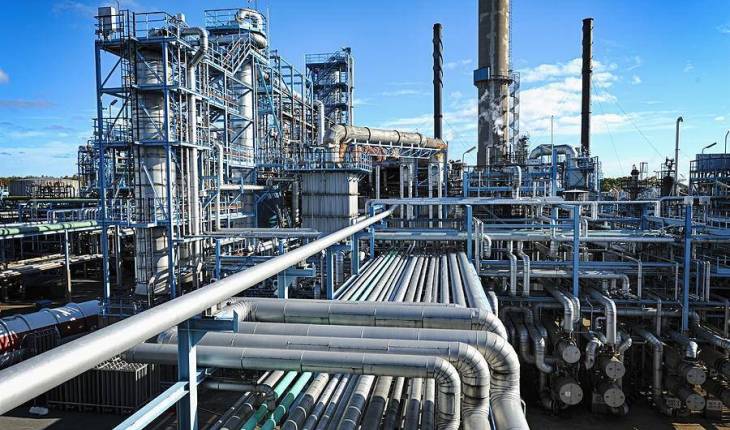- Dangote Refinery Orders Compressors, Turbines from German Firm
Africa’s largest refinery, Dangote Oil Refining Company, has ordered compressors and turbines from German-based MAN Diesel and Turbo for the 650,000 barrels per day refinery being constructed in Lagos.
MAN Diesel and Turbo will deliver two compressor trains to the refinery, which is located at the Lekki Free Trade Zone of Lagos, where Africa’s richest man and President of Dangote Group, Alhaji Aliko Dangote, is investing $12 billion.
The new refinery will enable Nigeria, Africa’s biggest crude oil producer, to increase its local refining capacity and end importation of petroleum products.
Also commenting, a member of the Executive Board and Chief Sales Officer of MAN Diesel and Turbo, Wayne Jones, said: “This is a milestone project and will have a huge impact on the economy of not only Nigeria but the whole of the West African region.
The Managing Director of MAN Diesel and Turbo in Nigeria, Sohail A. Khan, said: “This refinery new building is underlining the long-term growth perspective Nigeria and the region of West Africa have.
The highly efficient machinery trains from MAN Diesel and Turbo each consist of an axial compressor driven by a steam turbine with about 30 MW power.
Delivered with a comprehensive auxiliary package, they will come into operation for the refinery process of Fluid Catalytic Cracking (FCC), thereby supporting the production of fuel.
The order also comprises erection and inauguration of the machinery trains, being developed and built at the company’s turbomachinery technology site in Germany.
Delivery will take place in the course of 2018, while inauguration of the whole refinery is planned for 2019.
Beside Nigeria, MAN Diesel and Turbo holds subsidiaries also in other countries on the African continent.
With 250 employees across various sales and service sites, regional workshops and a pool of field service engineers, the company serves customers that are mainly active in the oil and gas industry, the power generation business or the process industry.
The company’s history in Africa dates back to the 1950s, when the first engines for power generation were delivered to Mali and Senegal.
MAN Diesel and Turbo SE, based in Augsburg, Germany, is the world’s leading provider of large-bore diesel and gas engines and turbomachinery.
Meanwhile, Tanzania has awarded a coal mining licence to the local subsidiary of Dangote Cement as part of the plans to cut the company’s production costs and ease disruptions caused by energy shortages.
The Tanzanian subsidiary of Dangote Cement had suspended production in December 2016, citing technical problems and high production costs, but has since resumed production of the building material.
“The process of allocating a coal mining area to the Dangote cement factory was completed on March 11,” Reuters quoted Tanzania’s Energy and Minerals Ministry as saying in a statement issued yesterday.
“The company (Dangote) will be given a (coal mining) licence covering 9.98 square kilometres in the Ngaka area,” the statement added.
The cement factory in the southeastern Tanzanian town of Mtwara, with an annual capacity of three million tonnes, runs on expensive diesel generators and has sought government support to reduce costs.
Tanzanian President John Magufuli had last week issued seven-day ultimatum to government officials to allocate a coal mining area to Dangote within the mineral-rich Ngaka coal fields, which are licensed to another company.
The Ngaka coal basin in southern Tanzania, an area covering more than 840 square kilometres, is licensed to Tancoal Energy Ltd, a subsidiary of Intra Energy Corp, which is listed on the Australian Stock Exchange.
Intra Energy said it would work with authorities to hand over part of its licensed coal mining area to Dangote, but raised concern about what it called “special treatment” being given to the Nigerian cement maker by the Tanzanian government.
The Australian coal miner owns a 70 per cent stake in Tancoal Energy, with the remaining 30 percent held by National Development Corp, a Tanzanian public investment firm.
Magufuli also ordered state-run Tanzania Petroleum Development Corp (TPDC) to supply Dangote Cement with natural gas with immediate effect.
Previous talks on gas supply had stalled because Dangote Cement wanted “at-the-well” prices for natural gas, according to TPDC.
Dangote, Africa’s biggest cement producer, has an annual production capacity of 43.6 million tonnes. It targets output of between 74 million and 77 million tonnes by the end of 2019 and 100 million tonnes of capacity by 2020.
In Tanzania, Dangote plans to double the country’s annual output of cement to six million tonnes.

 Naira3 weeks ago
Naira3 weeks ago
 News4 weeks ago
News4 weeks ago
 Naira4 weeks ago
Naira4 weeks ago
 Travel3 weeks ago
Travel3 weeks ago
 Naira3 weeks ago
Naira3 weeks ago
 Jobs3 weeks ago
Jobs3 weeks ago
 Naira3 weeks ago
Naira3 weeks ago
 Investment4 weeks ago
Investment4 weeks ago






























